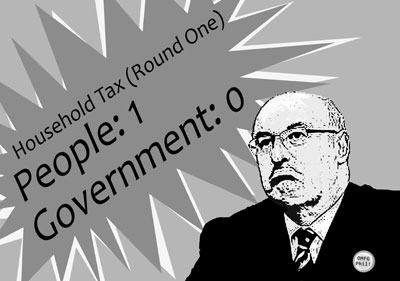Over 30 years of anarchist writing from Ireland listed under hundreds of topics
The Household Tax: Where to Now
 The Campaign Against Household and Water Charges (CAHWT) has been hugely successful so far in several ways: in encouraging mass non-payment; in making the taxes a big political issue, even in the mainstream media; in getting tens of thousands of people involved in protests and public meetings.
The Campaign Against Household and Water Charges (CAHWT) has been hugely successful so far in several ways: in encouraging mass non-payment; in making the taxes a big political issue, even in the mainstream media; in getting tens of thousands of people involved in protests and public meetings.
However, significant areas of the country e.g.: the Beara peninsula, Mayo, parts of Cork and Dublin cities etc have not become organised or active. Getting those areas to organise is a major key to winning the campaign. Regions should play a major role in reaching out and helping to initiate activity in areas, which are not yet organised.
For that to work, ordinary people in those areas will have to feel they have a real share in the ownership and control of the campaign, which means not only attending meetings and protests but participating in a properly democratic structure. People need to know that the grassroots is in control of the campaign, not just those people who are affiliated to left-wing organisations and not just people who are already experienced activists. To be actually democratic the structure needs to be participatory, not just representative. Local groups should elect delegates to the regional level of the Campaign, and those regions should elect delegates to the national body. Those delegates should be accountable, and recallable if they don’t accurately report the views of the groups that choose them. The delegates should be changed frequently in any case so that everyone, or at least as many people as possible, get experience of being a delegate.
Different local groups will have very different ideas about what tactics and activities they want to focus on. There should be very broad acceptance of these differences in approach while working towards the same goals. For example some groups may want to focus on lobbying politicians, others on fundraising, or picketing politicians surgeries, or producing their own leaflets, or protesting, or writing to the media etc. The central national structure should not attempt to impose the dead hand of uniformity on this diversity of tactics.
The Campaign has many dynamic and effective older people in its local groups, but we have not yet done enough to reach out to home owners in their thirties and forties who may have bought their houses at the height of the boom and now become trapped in negative equity. That particular age group may not have much positive experience of engaging in political struggle, partly due to years of partnership between union leaderships and governments.
The Campaign also needs to reach out to people who have already registered or paid the Household Tax this year, and come up with strategies to win them over to non-payment. Local groups need to build up a store of funds so that they can react rapidly to any enforcement procedures by the state against people who haven’t registered. Groups need to aim to keep up a steady, sustainable level of activity rather than over-reaching themselves. Co-operation between neighbouring local groups in carrying out their activities should be encouraged as a way of lessening reliance on direction from regional and national levels of the Campaign.
This article is based on an interview with campaign activist and WSM member, James McBarron.
From Issue 127 of Ireland's anarchist paper Workers Solidarity May / June 2012.

